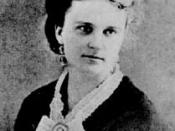Freedom in "The Story of an Hour" Mrs. Mallard's overwhelming response of "free, free, free!" upon hearing of her husband's death reflects the attitude of many nineteenth century women. During this time, highly restrictive gender roles forbade women to live as they saw fit. In "The Story of an Hour" Kate Chopin allows her audience to envision the moment that Mrs. Mallard is able to shed the bondage of marriage that was forced upon her. This was Mrs. Mallard's chance to actually live life on her own terms. Not on the terms prescribed to her by her husband. After this revelation on her behalf, the outcome of the story is both ironic and tragic.
Upon hearing the news of Brently's death Mrs. Mallard, who is afflicted with a heart condition, reacts with sadness at first, grieving with "wild abandonment" but shortly afterward seeks solitude to assess what has happened.
The location where she seeks isolation is important. She retreats to her bedroom in a comfortable armchair, indicating that this is a place where she feels safe. It is here that Mrs. Mallard seems to have found a way to rectify what she thought wrong in her life. Mrs. Mallard then realizes in a rush of emotion and relief that she is "Free! Body and soul free!" She views the world with a fresh outlook: one where she will be her own person, answering only to herself. For a brief moment the reader is able to see through to how she is truly feeling, her emotional release apparent when she sat "with her head thrown back upon the cushion of the chair..." She is overwhelmed with freedom, opening her arms to it, letting it envelope both her body and her soul.
While this realization is occurring, a...


